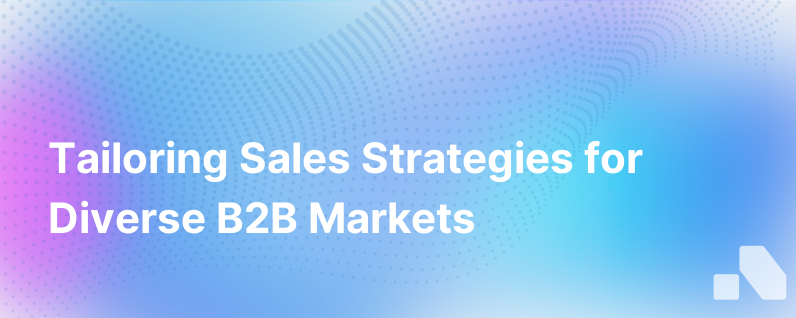Tailoring Sales Strategies to Diverse B2B Markets
Published on November 3, 2023 by Sawyer Middeleer
B2B sales is much like orchestrating a complex symphony with multiple instruments, each with a unique timbre and pitch that contribute to the collective musical masterpiece. To perform a symphony that resounds with each individual, the conductor—much like the B2B sales strategist—must adapt to the many nuances that define each market's unique rhythm.
The Spectrum of Diversity in B2B Sales
The diversity in B2B markets extends beyond mere geographic boundaries. It encompasses cultural norms, organizational hierarchies, economic frameworks, legislative climates, and decision-making processes. Hence, customizing a B2B sales strategy to resonate with the multi-tonal aspects of each market is not just beneficial—it's indispensable.
Cultivating Cultural Intelligence
In the kaleidoscopic world of B2B sales, cultural intelligence shines brightly. Knowledge of a region's business etiquette, communication style, and corporate governance can facilitate deeper connections and inform a nuanced sales approach. This intelligence extends to:
- Understanding of formalities and the importance of rank and title in business interactions.
- Sensitivity to direct versus indirect communication styles and their implications on negotiations.
- Awareness of non-verbal cues and the role of consensus in decision-making processes.
Data-Driven Strategic Refinement
To compete effectively in diverse markets, businesses must harness the power of data analytics. Big data can illuminate patterns, trends, and preferences, providing key insights that enable sales teams to:
- Craft personalized marketing campaigns that speak directly to the needs of specific sectors.
- Identify customer behavior and predict future demands with precision.
- Monitor competitor strategies and dynamically adapt to maintain a competitive edge.
Relationship Focused Sales Approaches
Relationships remain the cornerstone of B2B sales, particularly in markets where trust is the currency of business dealings. Sales strategies must account for the time and effort required to cultivate these relationships. This may involve:
- Frequent face-to-face meetings and social engagements preceding business discussions.
- Investment in local presence to establish trust and display long-term commitment.
- Fostering of local champions who advocate for the product or service within their organizations.
Localized Messaging and Solutions
The impact of localized messaging cannot be overstated. Sales strategies infused with local cultural nuances and language subtleties can resonate more deeply with a prospective client by:
- Demonstrating an understanding of the local market and consumer behavior.
- Employing storytelling that aligns with local values and customs.
- Customizing solutions to meet region-specific challenges and regulations.
Embracing Technological Advancements
Innovation in B2B sales isn't just about flashy gadgets or software but applying technology to cultivate meaningful connections. This can involve:
- Utilizing CRM and AI technology to automate personalized client interactions.
- Leveraging social media platforms to create dialogue and community around a brand or service.
- Offering virtual and augmented reality experiences to showcase product capabilities in an engaging manner.
Agility and Continuous Learning
Embracing a posture of learning is imperative for success in diverse markets. B2B sales strategies should be continually refined through:
- Regular feedback loops with local teams and customers to understand changing needs.
- Agile methodologies that allow for rapid iteration and adaptation of sales tactics.
- Continuous investment in professional development for sales teams to understand global business dynamics.
Cross-Cultural Team Dynamics
Building a sales team with diverse backgrounds and expertise can be a company's greatest asset. A diverse team brings:
- Varied perspectives that can lead to innovative approaches and problem-solving techniques.
- Language skills and cultural understanding that can bridge gaps and reduce miscommunication.
- Access to broader networks that can open doors and create new business opportunities.
Conclusion
In the multifaceted B2B marketplace, tailoring sales strategies to the vibrancy of diversity is not just about cultural sensitivities and analytics—it's about imbuing every aspect of the sale with insights that reflect an acute understanding of diverse needs. By considering these elements, businesses can construct B2B sales strategies that are as dynamic and varied as the markets they aspire to conquer.
For organizations seeking to streamline their approach to diverse B2B markets, a tool like Aomni can serve as an invaluable asset. Aomni facilitates the orchestration of individualized sales strategies with its AI-driven platform, providing the agility, insights, and competitive intelligence necessary to win across a wide spectrum of B2B landscapes. Whether it's optimizing account planning, refining market positioning, or scaling personalized marketing efforts, Aomni supports businesses in creating a harmonious sales symphony that resonates on a global stage.
Sources:
- Understanding Cultural Differences and their Impact on B2B Sales in Asia Pacific
- Cultural Alignment: A Secret Weapon in B2B Sales - C-Level Partners
- 7 Ways Data Analytics Can Help You Boost B2B Sales
- The Impact of Diversity on Marketing Innovation, Exemplified
- The Importance of Cultural Awareness in Business: How Diversity Drives Innovation and Customer Engagement
- Utilizing Data and Analytics in Sales for Informed Decision-Making: A B2B Perspective
- How B2B Marketers Across the World Look At Diversity, Equity and Inclusion
- Leveraging Growth Analytics for B2B Sales